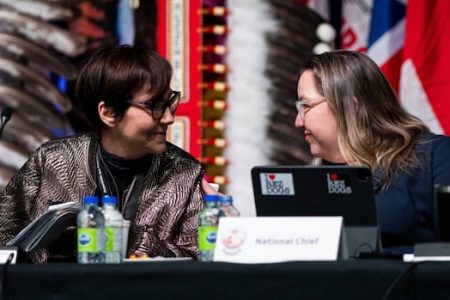The head of the Assembly of First Nations has penned a “concerned” letter to child advocate Cindy Blackstock, amid uncertainty about the future of long-term reform for the on-reserve child welfare system.
Publicly, National Chief Cindy Woodhouse Nepinak has been mostly silent after the Liberal government refused to reopen national negotiations on a rejected $47.8-billion proposal, only calling the decision disappointing and unfortunate.
However, a leaked Jan. 14 letter from Woodhouse Nepinak to Blackstock, executive director of the First Nations Child and Family Caring Society, shows the national leader seemingly stepping back and probing for answers.
“I sincerely wish you success in securing a better agreement than what was offered by way of the draft settlement agreement,” says a copy of the letter, obtained by CBC Indigenous.
“Moreover, I would appreciate it if the Caring Society could provide an update on its work towards obtaining a new improved Final Agreement in line with the mandates of the First Nations-in-Assembly.”
The AFN and Caring Society are co-complainants in an 18-year-old legal battle at the Canadian Human Rights Tribunal. The court-like body ruled in 2016 that Canada discriminates against First Nations kids by underfunding on-reserve child and family services.
The federal government put the multibillion-dollar proposal on the table to partially settle the complaint but chiefs turned down the offer at a heated AFN meeting last October.
On Friday, Blackstock said the letter’s suggestion that she is now somehow in charge of the process is untrue.
“I think we all have an obligation. The chiefs have provided this direction to AFN to go down this road of resetting the negotiations,” she said.
“That’s something that we’re doing our part on, and we’re hoping AFN does its part on as well.”
In the letter, Woodhouse Nepinak says “the AFN remains quite concerned with recent developments” and wonders whether the financial commitments under the rejected agreement are still secure.
“In light of these uncertainties, compounded by the current state of government and likely election in the short-term, I would certainly appreciate any clarity you can provide in relation to efforts to end the discrimination to which our children have been subjected to for so long.”
Blackstock said Canada is required to spend an estimated $45 billion under the tribunal’s existing orders and could be held accountable in court if it breaches those orders.
She was otherwise diplomatic in response to the letter. The Caring Society welcomes direct conversations, she said, but would prefer to avoid a “back channel kind of communication style.”
“I share that concern that Canada has chosen to only negotiate with one region in the country, and I’m really hoping that Canada changes its mind on that.”
Ontario groups respond to legal motion
Meanwhile, chiefs’ organizations in Ontario are rejecting “interference” by the Caring Society as they seek to carve out a regional deal from the original offer.
Chiefs of Ontario (COO) and Nishnawbe Aski Nation (NAN) say they’re disappointed Blackstock’s group filed a motion this week at the tribunal, seeking to force Canada back to the table nationally.
The motion also seeks an order directing consultation between Canada, AFN and the Caring Society on the Ontario-specific reform. The Ontario groups, however, say they don’t need to consult with anyone.
“We will not allow this to derail our process and distract us from the work that needs to be done,” said Ontario Regional Chief Abram Benedict and NAN Grand Chief Alvin Fiddler in a joint statement.
“The Caring Society has opposed this agreement from day one, and we do not want their latest procedural interruption to disrupt our progress towards a regional agreement they have already deemed to be ‘deeply flawed.'”
COO is a provincewide umbrella group and NAN represents 49 First Nations in northern Ontario.
COO and NAN are also parties to the complaint. For many years the four organizations formed a united front, but the recent split between them seems to be growing. COO and NAN endorsed the reform deal at their own special meetings. Woodhouse Nepinak supported the agreement while Blackstock opposed it.
The Caring Society filed its motion on the same day it received a letter from Canada which said it will not negotiate in line with the chiefs’ resolutions, arguing that they expand the talks outside the scope of the original complaint.
Blackstock said the motion doesn’t seek a seat at the table with Ontario, only to force Canada to have a conversation nationally and keep others informed if there’s any crossover.
“I just chalk that up to a misunderstanding,” she said of the COO and NAN news release.
Indigenous Services Minister Patty Hajdu’s office said in a statement that Canada has made every effort to reach a fair resolution outside of litigation, and is simply working with those who want to work with the government.

